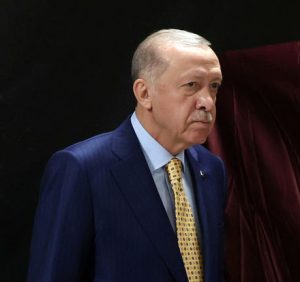Ahmet T. Kuru || April 4, 2024
 The reelection of Istanbul’s mayor Ekrem Imamoglu on March 31 means much more than a municipal win. It has consolidated Imamoglu’s reputation as the only politician able to defeat President Recep Tayyip Erdogan at the ballot box in the last three decades.
The reelection of Istanbul’s mayor Ekrem Imamoglu on March 31 means much more than a municipal win. It has consolidated Imamoglu’s reputation as the only politician able to defeat President Recep Tayyip Erdogan at the ballot box in the last three decades.
Imamoglu has done this three times. Five years ago, he became the rising star of the main opposition, the Republican People’s Party (CHP), by winning Istanbul’s mayoral seat against the candidate of Erdogan’s Justice and Development Party (AKP).
That was unacceptable for Turkey’s president who saw Istanbul as the jewel of his crown. Erdogan supported the country’s supreme election council’s cancellation of the election result. Nonetheless, Imamoglu won again with an even bigger margin in the rerun.
This made Imamoglu a popular alternative in the 2023 presidential election. Public surveys showed again and again that he would win against Erdogan. Meanwhile, a politically motivated court case created a potential legal barrier to Imamoglu’s candidacy. Another barrier was the CHP’s leader Kemal Kilicdaroglu who wanted the country’s top position for himself. Kilicdaroglu ran and lost against Erdogan in the presidential race.
Since the 2023 defeat, the Turkish opposition has become highly divided. The opposition parties refused a collaboration in the recent Istanbul election and ran with their candidates. Imamoglu had to win against both Erdogan’s AKP and opposition parties, which makes his victory even more important.
Beyond Istanbul, Imamoglu, 52, has successfully presented himself as a young and promising alternative to Erdogan, 70, who has been ruling Turkey since 2003.
At least for a decade, Erdogan has ruled by combining electoral popularity with authoritarian means. Thousands have become political prisoners, including Selahattin Demirtas, the former leader of the pro-Kurdish party. The Erdogan government has also jailed a record number of journalists while putting the overwhelming majority of media outlets under its control.
One thing Erdogan couldn’t control is the economy. The ongoing financial crisis has weakened his popularity. The value of US$1 was 5 Turkish lira (TRY) four years ago, whereas it’s more than 33 TRY today. In the last two years, the annual inflation rate surpassed 50 percent.
 The main causes of this crisis include the highly centralized presidential system Erdogan established after 2017 and his insistence on keeping interest rates lower than inflation between 2021 and 2023. Erdogan justified this unorthodox policy by referring to the Islamic ban on interest and his economic expertise. Recently, Erdogan made a U-turn on this but currency depreciation and high inflation have persisted.
The main causes of this crisis include the highly centralized presidential system Erdogan established after 2017 and his insistence on keeping interest rates lower than inflation between 2021 and 2023. Erdogan justified this unorthodox policy by referring to the Islamic ban on interest and his economic expertise. Recently, Erdogan made a U-turn on this but currency depreciation and high inflation have persisted.
The discontents of Erdogan’s authoritarian rule and financial failure have increasingly seen Imamoglu as an alternative.
What makes Imamoglu different from other opposition politicians is his ability to appeal to both secularists and Islamic conservatives. Although he is from the secularist CHP, founded by Turkey’s first president Mustafa Kemal Ataturk, Imamoglu (his name means the son of an imam) is a practicing Muslim.
He could recite the Quran in a mosque as an overture to religious voters, which was unthinkable for a leading CHP politician. At the same time, Imamoglu has shown a dedication to the secular characteristics of the state.
An Imamoglu leadership thus promises to reemphasize constitutional secularism in Turkey after Erdogan’s populist Islamist government.
Erdogan lacks a “crown prince”. None of his ministers or AKP parliamentarians has the charisma to become the leader of post-Erdogan Turkey. He couldn’t even find a popular candidate to run against Imamoglu in the Istanbul election. Regardless of whether Erdogan’s one-man rule has caused this situation, it works well for Imamoglu.
Is Imamoglu the politician who can make Turkey a secular democracy again? There is no definitive answer.
Imamoglu has not been tested yet on any issues at the national level. Many things about his possible national leadership are unknown, including whether he will make Turkey an ally of the West again in foreign policy.
But one thing is sure: his leadership will mean the reestablishment of a balance of power in Turkish politics, which has been missed since Erdogan defeated the secularist establishment and maintained his one-man rule a decade ago. Imamoglu is unlikely to inherit Erdogan’s one-man rule since he represents the opposition party in an almost evenly divided country.
Erdogan’s path to Turkey’s leadership began with his election as Istanbul’s mayor 30 years ago. The secularist establishment of that time did everything, including a prison sentence, to stop him, in vain. Whether Imamoglu will follow a similarly difficult road from Istanbul to Ankara–Turkey’s capital—remains to be seen.
 Ahmet T. Kuru (PhD, University of Washington) is the director of Center for Islamic and Arabic Studies and past Bruce E. Porteous Professor of Political Science at San Diego State University. He was a postdoctoral scholar at Columbia University. Kuru is the author of Secularism and State Policies toward Religion: The United States, France, and Turkey (Cambridge University Press, 2009), which received Society for the Scientific Study of Religion (SSSR)’s Book Award. He is also the co-editor (with Alfred Stepan) of Democracy, Islam, and Secularism in Turkey (Columbia University Press, 2012). Kuru’s articles appeared in various journals including World Politics, Comparative Politics, and Political Science Quarterly. His recent book Islam, Authoritarianism, and Underdevelopment: A Global and Historical Comparison (Cambridge University Press, 2019) co-won the American Political Science Association’s International History and Politics Section Award, received honourable mention of SSSR’s Award, and was included in Times Literary Supplement’s Books of the Year. Kuru’s works have been translated into Arabic, Bosnian, Chinese, French, Indonesian, Malay, Persian, and Turkish. This essay was initially published at the Jakarta Post at: https://www.thejakartapost.com/opinion/2024/04/04/did-istanbul-elect-turkeys-new-leader.html
Ahmet T. Kuru (PhD, University of Washington) is the director of Center for Islamic and Arabic Studies and past Bruce E. Porteous Professor of Political Science at San Diego State University. He was a postdoctoral scholar at Columbia University. Kuru is the author of Secularism and State Policies toward Religion: The United States, France, and Turkey (Cambridge University Press, 2009), which received Society for the Scientific Study of Religion (SSSR)’s Book Award. He is also the co-editor (with Alfred Stepan) of Democracy, Islam, and Secularism in Turkey (Columbia University Press, 2012). Kuru’s articles appeared in various journals including World Politics, Comparative Politics, and Political Science Quarterly. His recent book Islam, Authoritarianism, and Underdevelopment: A Global and Historical Comparison (Cambridge University Press, 2019) co-won the American Political Science Association’s International History and Politics Section Award, received honourable mention of SSSR’s Award, and was included in Times Literary Supplement’s Books of the Year. Kuru’s works have been translated into Arabic, Bosnian, Chinese, French, Indonesian, Malay, Persian, and Turkish. This essay was initially published at the Jakarta Post at: https://www.thejakartapost.com/opinion/2024/04/04/did-istanbul-elect-turkeys-new-leader.html

